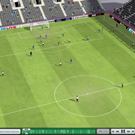- MENU
- HOME
- SEARCH
- WORLD
- MAIN
- AFRICA
- ASIA
- BALKANS
- EUROPE
- LATIN AMERICA
- MIDDLE EAST
- United Kingdom
- United States
- Argentina
- Australia
- Austria
- Benelux
- Brazil
- Canada
- China
- France
- Germany
- Greece
- Hungary
- India
- Indonesia
- Ireland
- Israel
- Italy
- Japan
- Korea
- Mexico
- New Zealand
- Pakistan
- Philippines
- Poland
- Russia
- South Africa
- Spain
- Taiwan
- Turkey
- USA
- BUSINESS
- WEALTH
- STOCKS
- TECH
- HEALTH
- LIFESTYLE
- ENTERTAINMENT
- SPORTS
- RSS
- iHaveNet.com
John Tyrrell

Second only to the terraces surrounding the hallowed turf of the nation's football (soccer) grounds, the pub is the next most popular setting for British football fans. So it's fitting that the offices of Sports Interactive Limited , the creators of the world's foremost and multi-million-selling football management simulation series, should be right on top of an establishment with big-screen match coverage and a solid draught beer selection. The William Blake Pub in central London has borne witness to many impassioned discussions about football -- and probably just as many again about the game's virtual progeny, the revered Football Manager series.
In Football Manager, players manage their favorite team from some 50 global leagues, buy and sell players and interact with the press and plan tactics -- all with the ultimate goal of topping the league and filling the boardroom trophy cabinet at the end of the season. The game's 3D match engine lets players watch every bout in real time, taking the game far beyond its previous 2D top-down presentation toward something ever closer to the real thing.
The Series' Beginnings
The series has come a long way since its genesis in the imaginations of Paul and Oliver Collyer, two young British football fanatics. The brothers' only aim was "to make a game that they could enjoy themselves," says Grant Appleyard, Sports Interactive's senior producer. Working from their Shropshire bedroom, the pair released the first Championship Manager -- a simulation game written in BASIC -- in 1992.
From this acorn grew the Championship Manager franchise. At peak, every subsequent release became the fastest-selling PC game ever in the U.K. Following a switch of publisher from Eidos Interactive to SEGA in 2004, as well as a name change to Football Manager, the team has continued its domination with Football Manager, released in November 2010 for the PC, joined by Football Manager Handheld for the Sony PlayStation Portable, the Apple iPhone and the Apple iPod touch. SEGA also released the MMO management sim Football Manager Live in 2009.
New Gameplay Features
This is not a series that rests on its laurels. The last 20 years have been one long, iterative process. "If you look at the features that we've added this year, it's something like 450," says Appleyard.
Most of the new features in the game come from the development team and are proposed, discussed and, if they pass muster, implemented in-game through a highly democratic process. Today, Paul and Oliver Collyer are far from being ivory-tower moguls. Paul is the match engine programmer, and Oliver (or Ov, as he's known to the team) is the lead programmer on Football Manager Live.
One of the important new features in Football Manageris the live contract negotiation system. Agents have become a permanent fixture of the footballing world, and game players can enter into complex negotiations with different virtual agents to master the minutiae of contractual clauses and secure their next big signing.
A feature that fans have been clamoring for is Dynamic League Reputation, a system that allows players who build strong teams to positively affect the reputation of the league they're playing in, ultimately letting them attract star players from elsewhere and bringing a new long-term dimension to the gameplay.
The Power Behind the Game Football Manager
"We have users that will play the game over a long period of time, and that's when optimizations that speed up the game generally come into their own because they're not sitting looking at the progress bar," explains Appleyard.
Such a heavy drain on the CPU can be substantially alleviated by optimizing parallel processing through multithreading. Sports Interactive has spent many years improving the multicore optimization in successive iterations of the game, the ultimate goal being to deliver the fastest player experience with the least waiting around.
Watching in 3D
The 3D match engine is a relatively new addition to the Football Manager series, making its debut in November 2008. The engine lets the user watch entire matches recreated in full 3D with the objective of immersing players in a live match-like experience. In Football Manager, crowd simulation has improved, as have player models and a TV camera, which brings the experience closer to watching a real match on television.
As with multithreading, ensuring it squeezes the optimum performance for the GPU-hungry processes involved in recreating the 3D experience is something that Sports Interactive has made a priority. Football Manager doesn't demand the latest hardware to deliver a great user experience. The graphics engine is optimized to run on even older processors.
Football fans would no doubt be the first to say -- to paraphrase the British football pundits -- that the game developers at Sports Interactive got the result they were looking for.
Screenshots: http://www.footballmanager.com
John Tyrrell's career in the game industry began with the launch of Nintendo's Pokemon on an unsuspecting British public in 1999. After a decade of experience in international public relations, supplemented with work as a freelance writer, he left his position as worldwide PR director at Atari in 2009 to establish Hot Socket, a communications consultancy based in Lyon, France.
Available at Amazon.com:
Mario vs. Donkey Kong Mini-Land Mayhem!